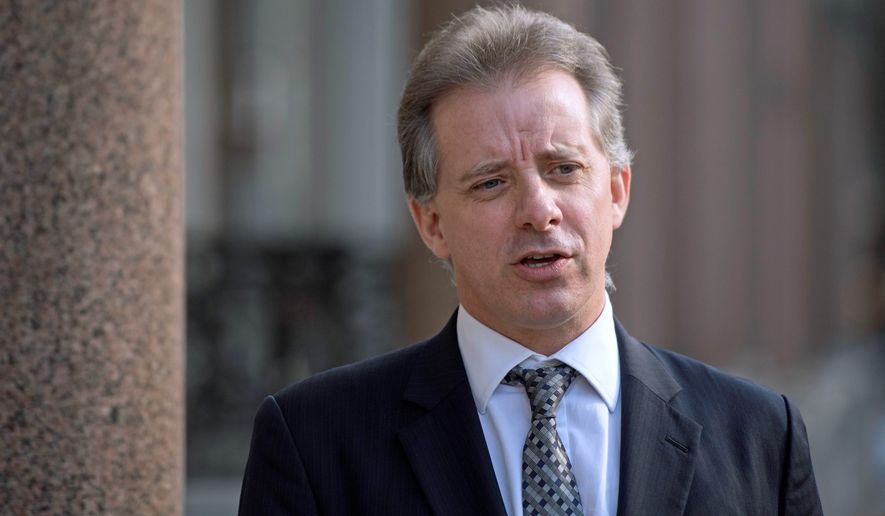A defamation suit against dossier creator Christopher Steele went to trial in London today, as Russian entrepreneur Aleksej Gubarev made his case that Mr. Steele committed libel by wrongly accusing him of hacking Democratic Party computers in 2016.
Mr. Gubarev, who heads XBT Holdings, a computer server provider, appeared in the last of Mr. Steele’s 17 memos in December 2016. Mr. Steele has said that unsolicited call-in material alleged that Mr. Gubarev hacked computers under pressure by Russian security.
Mr. Gubarev’s attorney, Andrew Caldecott, delivered an opening statement that said Mr. Steele’s status as a former MI6 spy, and the endorsements the dossier received in Washington from politicians, made the allegations believable, though false.
“There is no suggestion the allegations against the Claimants are true,” the attorney said. “There is no dispute that the allegation, wherever pitched, was likely to cause Mr. Gubarev serious reputational harm. That it did is abundantly clear from his first witness statement and is undisputed by the Defendants (Mr. Steele and his Orbis Business Intelligence).”
“The suggestion that Mr. Gubarev and his companies were knowingly using their servers for cybercrime created, we submit, an obvious likelihood of serious financial loss,” the attorney said.
Mr. Caldecott showed that Mr. Steele continued to push his dosser findings to the press after the election and also to Democrats, such as former Deputy Secretary of State Strobe Talbott.
“Dear Strobe,” Mr. Steele said in a direct message. “I know this is not straight forward but we need to discuss the package we delivered to you the other week, and sooner the better. What you thought of it, what you did with it, how we (both) should handle it and the issue it highlights going forward etc. Perhaps you could give this some thought and get back to me. All Best Wishes, Chris.”
Mr. Steele came to Washington that fall to circulated dossier material to reporters, the FBI and State Department before he wrote the only post-election memo in December. That memo was sent to Mr. Steele’s handlers, Fusion GPS in Washington, which provided it and the entire dossier to David Kramer. He is an associate of the late Sen. John McCain, Arizona Republican, and had been briefed by Mr. Steele in London.
Mr. Kramer then began circulating the document around Washington, including to BuzzFeed’s Ken Bensinger.
Mr. Caldecott quoted messages showing that Mr. Steele was in contact with the BuzzFeed reporter who obtained the dossier, including the anti-Gubarev December memo. The attorney suggested Mr. Steele had been hiding the proof from Mr. Gubarev’s legal team.
“The vanishing meeting between Mr. Steele and Mr. Bensinger suddenly appears, as it has
to, now that the Claimants [Gubarev] belatedly have the Bensinger messages,” he said.
Mr. Gubarev at once denied the allegations and first filed suit against BuzzFeed, which published the entire dossier on Jan. 10, 2017. He lost that case in Florida when a U.S. District Court judge ruled the dossier was fair reporting privilege since the FBI was using it to probe the Trump campaign.
The case in the High Court of Justice is being heard by Justice Mark Warby.
He ruled against Mr. Steele in a case brought by the owners Moscow Alfa Bank, who said they were defamed by the dossier.
• Rowan Scarborough can be reached at rscarborough@washingtontimes.com.




Please read our comment policy before commenting.